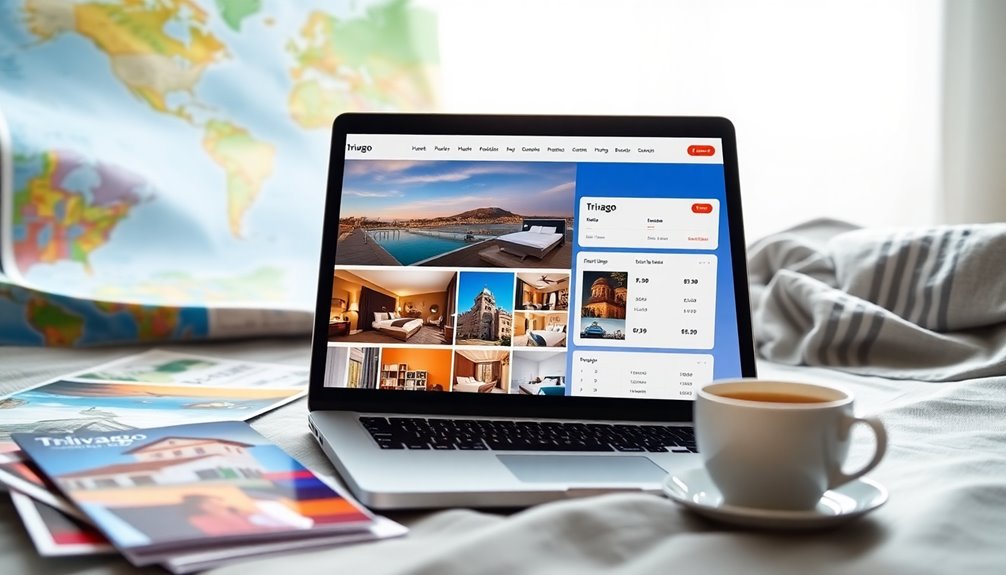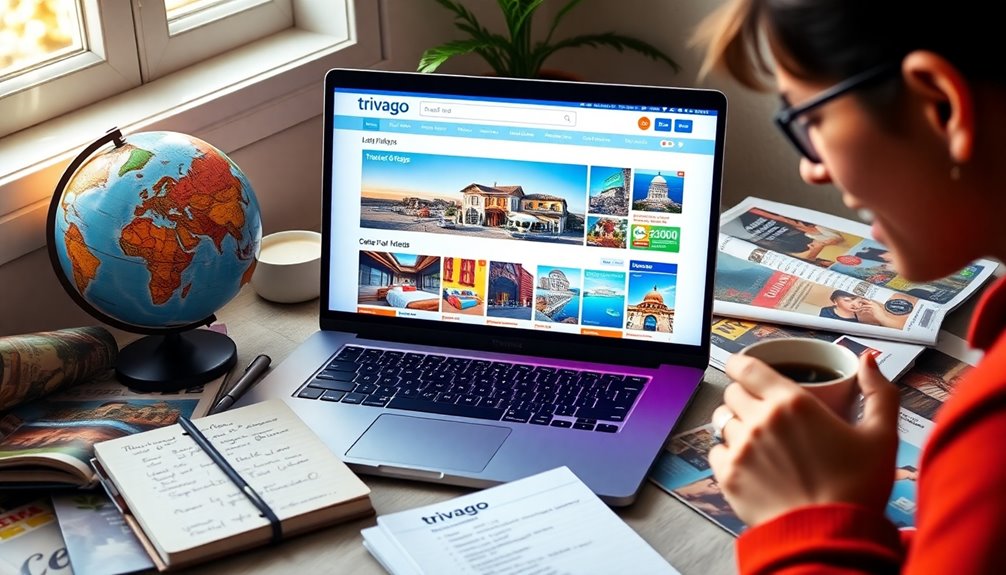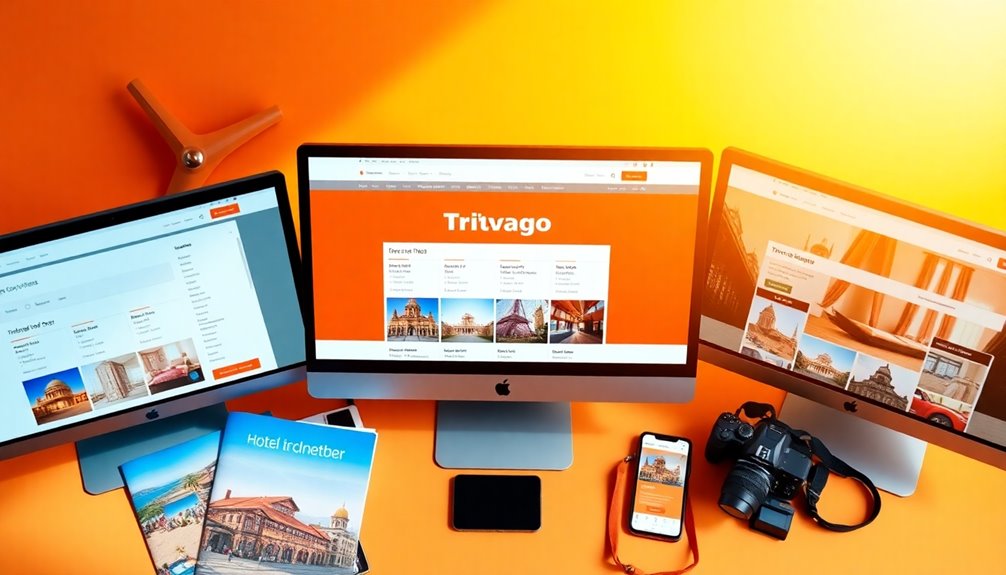I’ve spent quite a bit of time using Trivago for booking hotels, and I’ve seen both the advantages and the drawbacks. It offers an array of options and a straightforward interface, but I’ve often noticed that the prices aren’t always the lowest. So, is it really the best tool for finding cheap accommodations? Let’s unpack this a bit further and see how it holds up against other search engines.
Key Takeaways
- Trivago aggregates prices from multiple booking sites, allowing easy comparison but doesn’t always display the lowest available rates.
- The pricing algorithms prioritize partnerships, which may lead to higher prices being featured over the lowest options available.
- Users may encounter misleading prices due to added fees or outdated listings, which can lead to frustration.
- To ensure the best deal, it’s advisable to check prices across various platforms, including hotel websites directly.
- While Trivago is user-friendly and convenient for comparing hotel options, thorough research is necessary to maximize savings.
What Is Trivago and How Does It Work?

When I first came across Trivago, I was intrigued by how it simplifies the hotel booking process. It’s essentially a powerful search engine for hotels that aggregates listings from various booking sites. Instead of visiting multiple websites, I can enter my destination, travel dates, and preferences all in one place. Trivago then presents me with a variety of options, displaying prices and ratings side by side. This saved me a lot of time and effort, as I can quickly compare what’s available. I appreciate how it helps me find the best deals without getting overwhelmed by too many choices. Overall, Trivago makes finding the perfect hotel a breeze, ensuring I can focus more on enjoying my trip.
Features and Functionality of Trivago

Trivago’s features make the hotel search experience even more enjoyable. I love how intuitive the interface is—everything’s neatly organized, making it easy to filter results based on my preferences. Whether I’m looking for a specific price range, location, or amenities, I can quickly narrow down my options. The price comparison tool is a standout feature; it instantly shows me prices from various booking sites, helping me score the best deal. I also appreciate that I can read hotel reviews from fellow travelers right on the platform. The ability to save my favorite hotels for later is a game changer, too. Overall, Trivago streamlines my hotel search, making it both efficient and hassle-free.
Comparing Trivago With Other Hotel Search Engines

When I compare Trivago with other hotel search engines, I notice some key differences in price comparison features. The user experience is another area where choices can greatly influence my travel planning. Additionally, the accuracy of search results impacts how effectively I can find the best deals.
Price Comparison Features
While exploring hotel search engines, I found that Trivago offers robust price comparison features that set it apart from many competitors. When I input my travel dates and preferences, Trivago quickly aggregates prices from various booking sites, allowing me to see a comprehensive overview of available options. What I appreciate most is the ability to filter results by price, distance, and amenities, which makes it easy to find what I’m specifically looking for. Unlike some other platforms that might prioritize their own listings, Trivago gives equal weight to different sites, ensuring I get a fair snapshot of rates. Overall, its detailed comparison tools have made my hotel search much more efficient and straightforward.
User Experience Insights
Although many hotel search engines aim to enhance user experience, Trivago stands out for its intuitive design and streamlined interface. When I first used Trivago, I appreciated how quickly I could navigate through options. Unlike other platforms that feel cluttered, Trivago presents information clearly, making it easy to filter results based on my preferences. The visual layout is clean, and I found it simple to compare prices without feeling overwhelmed.
In contrast, some competitors I’ve used seemed to bombard me with too many options and ads. Trivago focuses solely on finding the best prices, which made my search feel more targeted. Overall, my experience with Trivago was pleasant, and it certainly feels more user-friendly than some alternatives I’ve tried.
Search Engine Accuracy
Trivago’s accuracy in search results often sets it apart from other hotel search engines, allowing me to quickly identify the best options available. When I compare prices on Trivago, I typically find that it aggregates data from various platforms seamlessly, which enhances my search experience. Unlike some competitors, I rarely encounter discrepancies in pricing, and if I do, they’re usually minor. Additionally, Trivago’s filtering options help me hone in on my preferences, ensuring I can choose hotels that meet my budget or desired amenities. While some other search engines can be overwhelming with choices, Trivago’s straightforward approach simplifies my search process. All in all, it’s a reliable tool when scouting for great hotel deals.
User Experience and Interface

When I first opened Trivago, I quickly noticed how intuitive the navigation features are, making it easy to find what I need. The search filter options really helped me narrow down my choices based on my preferences. Plus, the visual layout design is clean and user-friendly, enhancing my overall experience.
Intuitive Navigation Features
Navigating Trivago feels effortless, thanks to its intuitive design that puts user experience front and center. When I first opened the app, I appreciated how everything I needed was easily accessible. The layout is clean and visually appealing, which made me feel comfortable right away. The search bar stands out, allowing me to jump straight into finding accommodations without any confusion. Each section has clear labels, so I always knew where to go next. Plus, the quick-loading images and information kept me engaged. I found it refreshing not to deal with unnecessary distractions. Overall, Trivago’s navigation made my hotel search a breeze, enabling me to focus on finding the right place to stay without adding any stress.
Search Filter Options
After enjoying the seamless navigation features, exploring Trivago’s search filter options enhanced my experience even more. I found it super easy to narrow down my hotel choices based on what truly mattered to me. Whether I wanted to filter by price, location, amenities, or guest ratings, the process was straightforward. I appreciated how I could select multiple filters at once, allowing me to find a hotel that met all my criteria. Plus, the results updated instantly, which made refining my search feel intuitive. It didn’t take long for me to pinpoint the perfect spot for my trip. Overall, Trivago’s filter options definitely contributed to a more tailored and enjoyable search experience.
Visual Layout Design
Trivago’s visual layout design immediately struck me with its clean and modern aesthetic. The site’s simplicity made navigation feel intuitive, allowing me to focus on finding the best hotel deals without distraction. The prominent search bar invites users to dive right in, while well-organized categories help streamline the experience. Eye-catching images of hotels draw me in, showcasing options beautifully.
I appreciated how the color palette is soothing, making browsing enjoyable rather than overwhelming. The responsive design adapts seamlessly across devices, ensuring that I felt comfortable whether I was using my laptop or smartphone. Overall, Trivago’s layout creates an efficient and pleasant user experience, encouraging me to return whenever I need to book accommodations.
Analyzing Trivago’s Pricing Algorithms

While exploring different hotel booking options, I’ve noticed that the pricing algorithms behind Trivago play a significant role in determining what travelers see. These algorithms scour various hotel options, crunching data from many booking sites to compile the best deals. They consider factors like location, user preferences, and even seasonal pricing trends. However, I often wondered how transparent this process is. I’ve found that Trivago displays prices based on partnerships with booking sites, meaning the lowest price might not always surface immediately. It’s crucial to remember that these algorithms aim to maximize revenue for Trivago and its partners. So, while their system is advanced, it’s wise for travelers to double-check prices across multiple platforms before booking.
Pros and Cons of Using Trivago

Although I appreciate the convenience Trivago offers for comparing hotel prices, there are both advantages and disadvantages to using the platform. On the plus side, Trivago’s user-friendly interface allows me to quickly compare rates from various booking sites, helping me find competitive deals. I also love how I can filter my search based on location, amenities, and guest ratings, making it easier to find the right fit.
However, I’ve noticed that some prices can be misleading; they might not include added fees or specific restrictions. Additionally, I sometimes encounter outdated listings that can lead to frustration. So, while Trivago can be a handy tool for travel planning, I think it’s crucial to do some additional research to ensure I’m getting the best deal.
Final Thoughts on Trivago’s Effectiveness

After weighing the pros and cons of Trivago, I find it to be a mixed bag when it comes to effectiveness. On one hand, it offers a user-friendly interface and a wide range of options, making hotel comparisons easy. I appreciate having multiple booking sites at my fingertips. However, I’ve noticed that it doesn’t always surface the absolute lowest prices; some listings seem outdated or inaccurate. Plus, while I love the convenience, I still recommend checking the hotel’s website directly for the best deals. Overall, Trivago can be a helpful tool in my travel toolkit, but it shouldn’t be the only resource I rely on for booking accommodations. Balancing it with thorough research ensures I get the best value for my stay.
Conclusion
In my experience, Trivago can be a handy tool for comparing hotel prices and options, but it’s not always the best for finding the absolute lowest rates. While its user-friendly interface makes travel planning easier, I’ve often found better deals by checking hotel websites directly. So, if you’re using Trivago, make sure to complement it with some extra research. Balancing both approaches will lead to the best outcomes for your travel accommodations.

